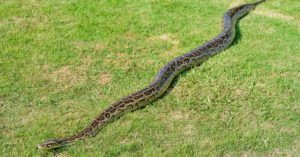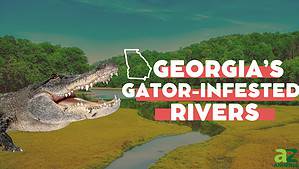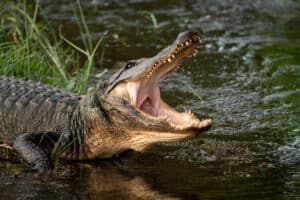To some, alligators are the stuff of nightmares. To others, they’re extraordinary hunters from another time. Still, to others, they’re nothing more than a meal. Louisiana is home to a rich and varied natural ecosystem, one that includes millions of acres of swamps and wetlands. These wetlands are home to one of the fiercest reptilian predators on Earth; the American alligator. Alligators are native to Louisiana, which leads to the question: how many alligators live in Louisiana?
Keep reading to learn more about the American alligator, and where in Louisiana they live and hunt. We’ll also find out how to identify alligators, and discover whether or not they can be hunted in Louisiana. Along the way, we’ll discuss the most alligator infested lakes in the state, and go over a few key steps you can take to avoid a negative interaction with an alligator.
The American Alligator
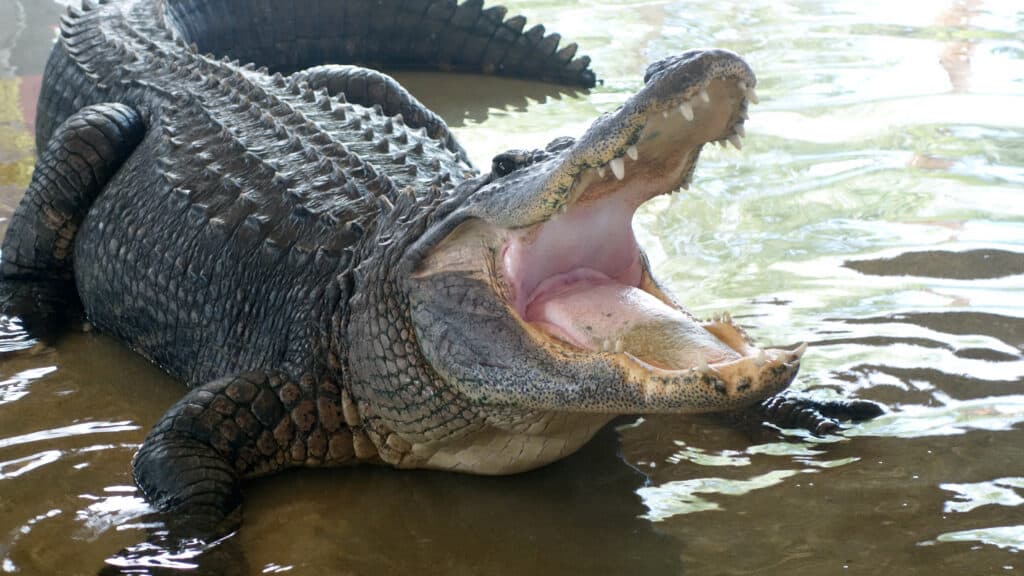
Alligators are fierce reptiles.
©Ernie Hounshell/Shutterstock.com
American alligators are one of only three species of crocodilian in North America. The other species are the American crocodile and the spectacled caiman, which have much smaller populations than the American alligator. Other types of crocodilians include gharial and false gharial. Interestingly, there is only one other type of alligator on Earth, the Chinese alligator. These alligators live only in China, where they’re extremely endangered.
Where do Alligators Live?
To answer the question: how many alligators live in Louisiana? We first need to know where in the world you can find alligators. Alligators are native to North America. Specifically, they live in the southeastern United States. They live in freshwater as far north as North Carolina and as far west as Texas. Alligators are creatures of the coastal lowland, and live throughout Louisiana.
What Do Alligators Look Like?
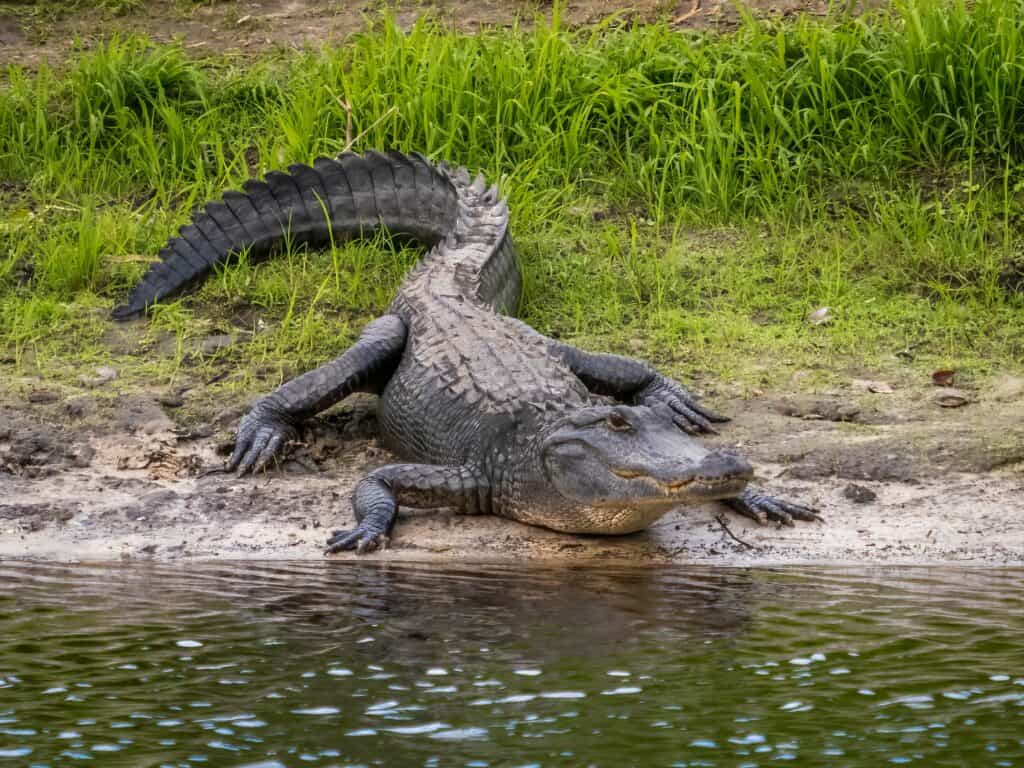
Alligators have wide snouts.
©Jim Schwabel/Shutterstock.com
Alligators have thick, armored bodies that can withstand just about anything (other than other alligators, and humans). They’re brownish green, with up to 80 teeth lining their jaws. Adults grow up to 15 feet long and come equipped with short legs and long tails. Their toes end in wickedly sharp claws that are mostly used to dig, and, when on land, to run.
Alligators look very similar to crocodiles. However, alligators have wider snouts. And, when they close their mouths, only their top teeth poke out. Baby alligators have bright yellow stripes on their tails, while adults have black stripes.
Louisiana’s Alligator Population
According to the Louisiana Department of Wildlife and Fisheries, there are an estimated two million gators living in the state. This makes Louisiana the alligator capital of the world. In comparison, Florida has an estimated 1.3 million gators, while Oklahoma has just 100-200. But, why so many gators? Well, Louisiana has over four million acres of suitable alligator habitat, including marshes, swamps, and lakes.
Where Do Alligators Mostly Live in Louisiana?
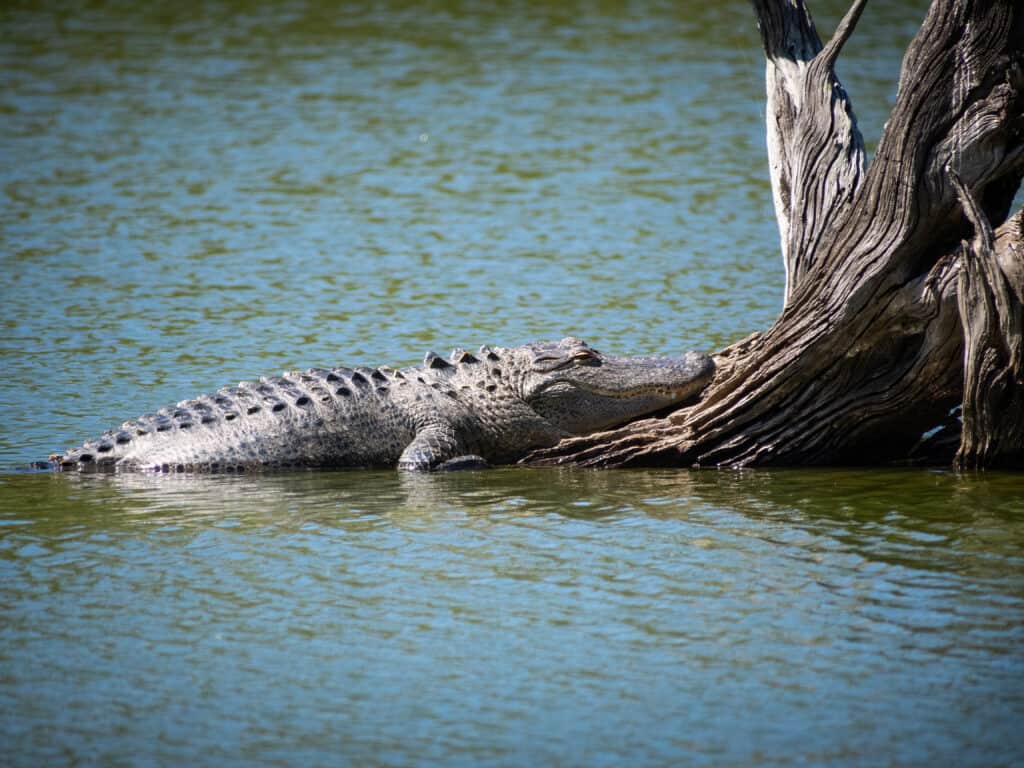
Alligators in Louisiana live in freshwater.
©Eugenie Robitaille/Shutterstock.com
Now we know how many alligators live in Louisiana, but, where do they live? Alligators inhabit the entirety of the state. But, they live only in freshwater, as they can’t tolerate salt water (unlike their larger cousins, saltwater crocodiles). Many live in coastal marshlands and cypress-tupelo swamps (including the Atchafalaya Basin swamp), while many more inhabit the state’s lakes.
Louisiana’s Most Alligator-Infested Lakes
Louisiana is full of lakes, swamps, and marshlands. A few of the most alligator-infested lakes in Louisiana include Cypress Lake, Cross Lake, Caddo Lake, and Lake Martin. These lakes, and many more in the state, play host to adult and juvenile alligators alike. All alligators start out life as eggs contained in nests built by their mothers. Mother alligators will aggressively defend their nests from intruders, so it’s wise to give them a wide berth.
Can You Hunt Alligators in Louisiana?
They might be exotic animals to some, but in Louisiana, alligators are just another game species. They’re harvested for their meat, bones, and hides. The Louisiana Department of Wildlife and Fisheries allows alligator hunting on both private and public lands—with a permit. They also take care of any nuisance alligators and conduct research and surveys to better conserve the state’s wild alligators.
Louisiana’s alligator hunting zones are split in half; an eastern zone, and a western zone. The eastern zone opens to hunting for a total of 60 days, starting in late August. The western zone also opens for just 60 days starting in early September.
Staying Safe Around Alligators
Traveling to Louisiana and wondering how you can stay safe from negative interactions with alligators? Well, your first step is to treat every wild animal you encounter with respect and caution. Alligators are adept predators, and won’t hesitate to pass up an easy meal. So, don’t approach them, and never feed them. Further, pay attention to local warnings regarding gators; if there are signs warning of big alligators in the area, don’t go swimming. Finally, stay at least ten feet back from the water’s edge, as alligators can lunge far from the water to attack. This also goes for pets and children.
Up Next
The Biggest Alligator Ever Found in Louisiana
Discover the Most Alligator Infested Lakes in Louisiana
The photo featured at the top of this post is © Steve Byland/Shutterstock.com
Sources
- , Available here: https://www.wlf.louisiana.gov/species/detail/american-alligator#:~:text=Louisiana%20and%20Florida%20have%20the,common%20in%20our%20coastal%20marshes
- , Available here: https://www.britannica.com/animal/alligator
- , Available here: https://www.wlf.louisiana.gov/page/alligator-hunting#:~:text=Residents%20may%20hunt%20alligators%20on,License%20and%20alligator%20harvest%20tags
Thank you for reading! Have some feedback for us? Contact the AZ Animals editorial team.



